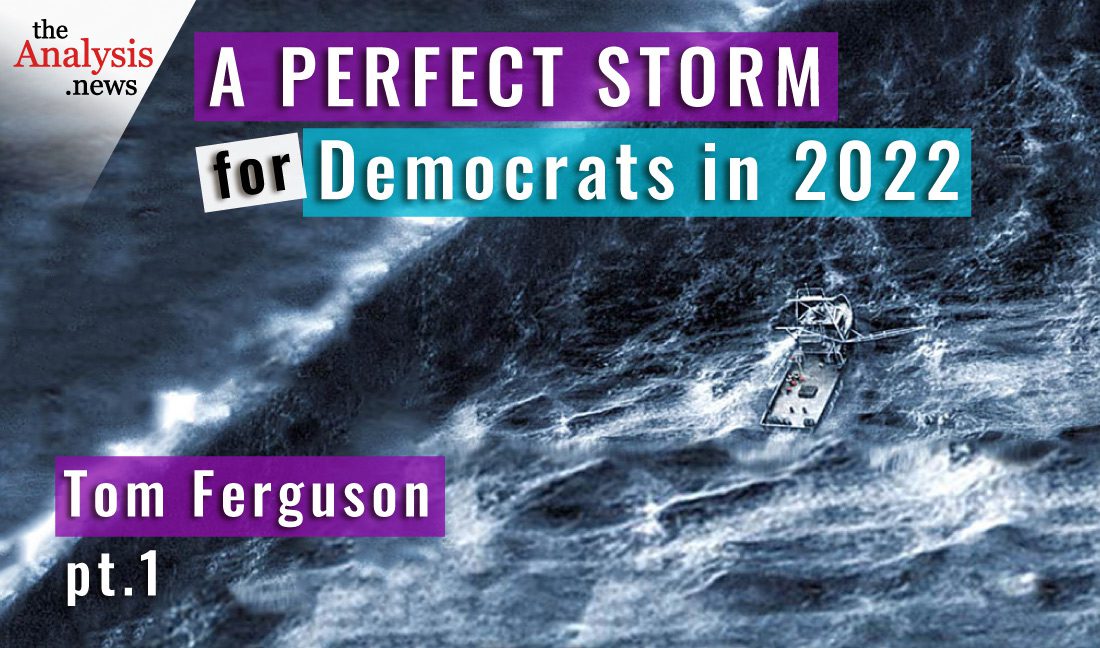Analysis of voters in the 2016 elections indicates that Covid and political money will lead to many lost Democratic seats in 2022. Political scientist Tom Ferguson joins Paul Jay on theAnalysis.news.
Link to the article – https://www.ineteconomics.org/research/research-papers/the-knife-edge-election-of-2020-american-politics-between-washington-kabul-and-weimar
TRANSCRIPT
Paul Jay
Hi, I’m Paul Jay. Welcome to theAnalysis.news. A perfect storm is brewing. We’ll be back in just a few seconds with Thomas Ferguson to talk about it. Please don’t forget, as you’re considering your year-end donations, theAnalysis.news is a 501 C3 in the United States, so if you want to donate and avoid some taxes, you could do so. Also, subscribe if you’re on YouTube and, most importantly, get on our email list and share it with as many people as you can, and we’ll be back in just a few seconds.
A perfect storm is gathering for the Democratic Party in the 2022 midterms and perhaps 2024 in the presidential election. In an analysis of the 2020 election, titled, 2020’s Knife Edge Election: An Analysis, by Thomas Ferguson, Paul Jorgensen and Jie Chen, it concludes with the following:
“If the Biden administration fails, what then? At the opening of this essay, we saw how most of big business, even parts of it otherwise friendly to [Donald] Trump’s policies, were not prepared to tolerate the disjointed efforts by the President and a minority of his supporters to overthrow the election results. But it is already obvious that the resonant promises by many businesses to cut off supporters of the January 6 putsch from future political funding are hollow.”
It goes on:
“Food and energy price rises are running very high, while wages are not keeping pace. Especially if the administration cannot get a better grip on COVID (which heavily impacts daycare, schools, and older workers near retirement and thus labor supply), then serious deterioration in living standards of many Americans becomes a real possibility. Recent statistical studies suggesting that “deaths of despair” and related pathologies largely mirrored dismal existing patterns rather than increasing should be a red flag, given the lapse of pandemic support programs.”
“One must wonder what could happen in the event of another economic downturn or a resurgence of movements for social justice and the defense of living standards squeezed by food and energy price inflation. Putsch attempts that started out looking like opera bouffe (that’s a comic opera in Paris) have sometimes led to much worse.”
And that means not so comic. Thomas Ferguson is about to join us. He’s a Professor Emeritus at the University of Massachusetts, Boston. He’s Director of Research at the Institute for New Economic Thinking and a senior fellow at Better Markets.
Thank you very much for joining us, Tom.
Thomas Ferguson
Well, thanks for having me, Paul. There’s so many alternatives these days to not showing up. I can say with unusual passion that I’m very glad to be here.
Paul Jay
Thank you. Well, we’re happy you are. Essentially, you have done a really deep analysis of what happened in 2020. We’re going to do four segments in this interview. Part one, we are going to deal with the perfect storm brewing for 2022. Part two, we’re going to look at just what the paralysis of the Democratic Party is and what they’re trying to do and what that paralysis could lead to. Part three, we’re going to look at something very unique in this paper; it’s the analysis of Trump’s agricultural policies and how that helped him in the 2020 election and might do so again. In part four, we’re going to look at the forces against effective climate change policy, fossil fuel industry sections of private equity and Wall Street.
But first of all, the perfect storm. So, Tom, what do you learn from the 2020 election that makes you think such a storm is brewing?
Thomas Ferguson
Well, all right. First of all, I think people have argued up and down about this, but our paper, I think, shows pretty convincingly that Trump was probably a winner in early 2020, despite all the negatives he had for all kinds of reasons. And COVID cost him the election, along with, in the end, the net result of all the mass demonstrations. And I think we’re the only people that have looked at this as our impact on county-level voting. The combination of social protest and COVID cost him the election, but the social protest is obviously growing in no small part out of the inability to deal with COVID.
And frankly, after a year of Joe Biden, almost a year, they haven’t dealt too effectively with COVID either. And now they have what Trump didn’t have: a real inflation problem. And so you put those two together, and, yeah, that’s the perfect storm. I hate to use cliches. I could imagine things even getting worse. No trouble. My usual slogan that I use at the end of the interviews is if you want a happy ending, see a Disney movie, but here, alright, we’re going into the interview.
Paul Jay
Okay. Let’s break down what you just said. So let’s start with the issue of social protest. One of the conclusions you reach in your study, which is a little bit counterintuitive from what the media has been saying, is that overall, the Black Lives Matter protest actually helped the Democrats. Where a lot of people are saying, for example, the slogan ‘Defund the Police’ actually helped defeat some Democrats. So break that down.
Thomas Ferguson
Okay. I begin, though, by noting that as you said, it wasn’t just me, Paul Jorgensen and Jei Chen; we did it together. But let me explain first what we did, which is we actually look at county voting returns. So it’s an aerial study, meaning we’re looking at— so we can do things that you can’t do in national polls. I mean, you can take a national poll, and you get it as though the whole country were a point or something. What we did is we actually looked at other people’s data sets on riots at Princeton, data sets on social turmoil, and also Mike Elk at Payday’s Labor Wildcat Strike.
We look at those and put those into a broader study of what’s driving the election. And along with COVID, you can see that the net result of all the demonstrations, I would be a little cautious about identifying everything with Black Lives Matter. There’s like 20,000 or more protests of various sorts in some of those data sets, and the labor stuff is not caught in any of that. But we do it. And the net effect of that was, it’s for sure, it seems to have helped Biden a bit there.
Now, does that mean that everything individually is popular? I rather doubt that ‘Defund the Police’ is a winning slogan. Although when you unpack ‘Defund the Police’, what you find is it’s mostly a collection of recommendations that have been almost standard in criminology and similar disciplines since the 1990s. In that respect, most of it is not particularly strict, but I think the slogan is probably a vote loser. And yeah, I also think the immigration question that is sometimes posed as simply— I mean, there are folks who have suggested that some of those movements were for just open borders, I don’t think that’s generally the case, but that’s surely a vote loser, too. But the protest movement, I think, did not cost the Democrats votes. On the contrary, it gave them a slight net plus, I think.
Paul Jay
Okay, but the big headline here is that Trump, because of his strength in the swing States, was on his way to victory and so mishandled the COVID situation. So why did he so mishandle the COVID situation?
Thomas Ferguson
Alright. We spend a lot of time on, I think it’s fair to say we put a lot of effort into that because the media reporting on this stuff has not been very good. The question is, how come the CDC [Center for Disease Control], the Trump administration, any number of private hospitals and chains and so forth (and not just in the United States, but elsewhere). What was the problem with getting effective responses? Because the U.S. basically did very little under Trump, and while the usual view has been it’s all Trump’s fault at that point, the Biden administration has not really grasped the nettle here. They’re bringing out, even as we speak, a new program designed to deal with Omicron, but they just haven’t done it.
I mean, we spend a good deal of time documenting the business pressures around the world because there’s a considerable interaction. In the early period of the Trump administration, the interaction with the U.K. is very strong, and the statistical and epidemiological studies go back and forth. And I know I’ve seen this myself in various meetings. You want to pay attention to the international context, but there was just, everywhere from the moment this started, governments like in Italy or in Austria, they just wouldn’t close down. The Tyrol, very famously, became a place where super spreading went out from skiers to the whole of Europe in January and February of 2020.
In the U.K., while Boris Johnson made a mess of things and the Trump people were following, there was a tremendous amount of direct business pressure, and we document it, especially from Trump’s Kitchen Cabinet. It is striking to me how many books on the election just drop out? I think I’m right that the private equity folks in that Kitchen Cabinet, not to mention the whole Kitchen Cabinet, barely figure in the Washington Post book, which is otherwise pretty good on some aspects of the 2020 election. It does figure in the New York Times coverage; I’ll give credit for that, but there’s been basically a continuous abogado running that basically says, let’s try to disrupt as little as possible normal business.
Now, what that leads to— I wrote a paper with Philip Alvelda and John Mallery in which we sort of showed the obvious; that if you let COVID get going, then the breakdowns get bigger. All you do is postpone the inevitable, and you get smashed. Now the U.S. never, and still does not have, now two years into this, with a year under Biden, they don’t really have big, large-scale, mass testing on a random basis, so they can’t actually track variants.
Even today, stories are appearing about how the U.S. is sitting around trying to use foreign data, our CDC, for example, to try to figure out what’s with Omicron. This is crazy. They should have done that. They should have done it quickly when they came in. They’ve been putting out stories in recent weeks saying they’ve done it. They haven’t done it to the level that they should, but the mass testing business, they just neglected. Nobody tried to push rapid, cheap tests, I think, in any serious way. And the scale of the efforts, especially where this has been catastrophic. Lots of, well not lots, but there’s some excellent, cheap, large-scale tests that you can do that are quite inexpensive. Schools and those that haven’t been using them mostly: the public schools, they’re stuck with their legacy certified providers, and so they’re paying way more than they should for tests. The failures on school policy in both Trump and Biden have been really grotesque.
Again, Philip Alvelda, and I, and Deepti Gurdasani, who was primary researcher in the second wave of British studies, wrote a paper on this; these are all published out of INET, by the way (Institute for New Economic Thinking). They’re easily available on the Web. We took a critical eye at the proposals to go back. The Biden administration wanted to do it on March 15, which was obviously nuts. And for about three weeks, Randi Weingarten, actually in the American Federation of Teachers, just actually read the paper, took it seriously and said we ought to rethink this. Then she did a 180 about a month later on that, and in practice, you can see what they did is they slow-walked the business of going back into education.
But people have not pushed on the big key question of ventilation at school. We know that more than half of American schools, public schools, have very old ventilation systems or nothing at all. They open a window, which is fine until it gets to be January in Boston or someplace. The ventilation problem has not been addressed. They should have insisted on if they were going to go back to everybody going back on airplanes; they should for sure have mandated testing to get on domestic flights as well as the international flights. And they haven’t. According to press reports, they’re not doing it today, either. That’s a big mistake.
Most of all, though, Trump put a lot of effort into vaccine development with the federally subsidized one way or the other, sometimes direct cash, sometimes giving them a guarantee to buy on vaccines. Their other efforts were less successful. They were also trying to do various low-level remedies than vaccines. But the Biden administration basically has put all of its money on vaccines. I mean, they think just get vaccinated, and everything will solve itself. Well, it won’t solve itself, and they’re finding that out. You’ve got to have a multilayered defense. Yes, people need to get vaccinated.
But like even under Biden, the CDC was very slow to take the point of the Israeli studies on the need for revaccination as the efficiency of the vaccine ails, and they should have picked up on that much faster. Now, they’re rushing. The Biden people are now trying to rush that one through, but your net effective vaccination rates, if I may use that term, are not what the published rates of vaccination suggest because it deteriorates with time.
And, of course, the giant policy failure. I mean, you’re among the many people who’ve called attention to this, Paul. So why not give credit where credit is due. They have not pushed nearly hard enough and fast enough to vaccinate the rest of the world. I don’t believe that a normal government program would have given you the vaccination efforts that they got. Even though those rest heavily on things like the big DARPA [Defense Advanced Resource Project Agency] grant that helped create the mRNA vaccines and other federal support, the National Institute of Health, and so forth for a long time.
In that respect, okay, so you need private companies, but the patent rights these folks have negotiated for, and their ability, which is still not in— many of their deals with most countries are still secret. They shouldn’t be allowed to bluntly extort the rest of the world the way they appear to be trying to do. And the government, Biden’s administration, has clearly started leaking reports on some of them now and is trying to pressure them indirectly. These guys need to be told that you can’t hold the rest of the world hostage in this policy.
It’s a little bit like the London sewer systems in the late 19th century that made even rich Londoners sick, sometimes. If you don’t do anything about the rest of the world, they’ll generate over time. Even if you can reduce it in your country, which we have done only in part, the rest of the world that’s unvaccinated will keep generating variants, and some of these are really dangerous. We’re all arguing about Omicron as we sit here, but it’s like they should push much harder on that. That’s a policy failure, and they’re not doing nearly enough.
Paul Jay
All right, part one, or point one of the perfect storm for 2022 is COVID ain’t over, and it sunk Trump, and it could contribute to sinking the Democrats in 2022 because of all the economic disruption and suffering that’s going to be the result of the continuation of COVID in one variant or the other.
Okay, let’s continue this discussion in part two of this interview, but I want to somewhat correct something I said at the beginning of the interview. I said, there’s a perfect storm brewing for the Democrats. Well, if the Republicans are able to take control of the House and perhaps the Senate, that’s a perfect storm for humanity. That means climate deniers have now taken control of American legislative power. And in the last two years of Biden’s presidency, there won’t be anything serious done on climate, and who knows what the hell happens in 2024. So this is really a perfect storm for humanity. So we’re going to talk about the politics of climate in part two.
Thomas Ferguson
One friendly amendment to that. The other thing you’ve got to realize here is that climate change is hugely bound up with, in practice, re-distributional changes that work mostly against ordinary people.
Paul Jay
Okay, well, let’s do that in the next segment. Join us for part two; we’re going to focus on 2022, the politics of climate. And also, Thomas has done some important research on the breakdown where fossil fuel and private equity money went right up to the last second in the 2020 election and where it’s going to go again, an active block fighting against effective climate change policy. So please join us for that. Thanks, Tom, and we’ll be back with part two in just a few days.
END









